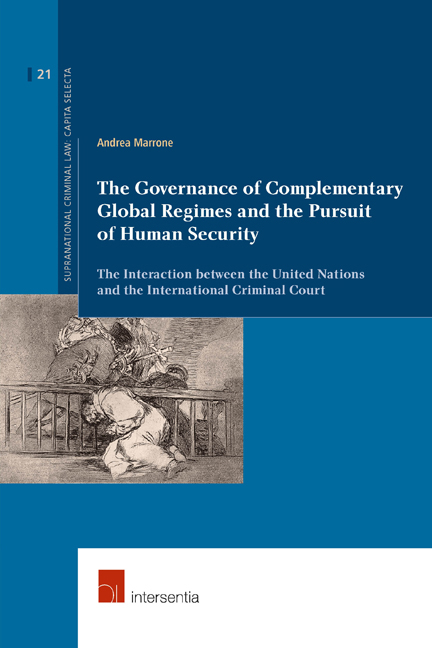 The Governance of Complementary Global Regimes and the Pursuit of Human Security
The Governance of Complementary Global Regimes and the Pursuit of Human Security Book contents
- Frontmatter
- Preface
- Study Outlook
- Contents
- List of Abbreviations
- INTRODUCTION
- PART I THE QUEST OF COMPLEMENTARITY AND THE DILEMMA OF HUMAN SECURITY
- PART II THE GOVERNANCE OF COMPLEMENTARY GLOBAL REGIMES: CHALLENGES, OBSTACLES AND CONCERNS
- PART III THE HUMANITARIAN ESCALATIONS OF LAST RESORT AND THEIR GOVERNANCE IN THE FIELD OPERATIONS
- 6 The International Responses to Mass Atrocities in Africa and the Criminal Regime in the Sudan
- 7 Multidimensional Operations and the Issue of Cooperation in the Democratic Republic of Congo (DRC)
- 8 Concluding Assessment. The governance architecture dealing with individuals in situations of war and crime
- Executive Summary
- APPENDICES
- Treaties, Legal Texts and Sources
- Bibliography
- About the Author
6 - The International Responses to Mass Atrocities in Africa and the Criminal Regime in the Sudan
from PART III - THE HUMANITARIAN ESCALATIONS OF LAST RESORT AND THEIR GOVERNANCE IN THE FIELD OPERATIONS
Published online by Cambridge University Press: 15 December 2017
- Frontmatter
- Preface
- Study Outlook
- Contents
- List of Abbreviations
- INTRODUCTION
- PART I THE QUEST OF COMPLEMENTARITY AND THE DILEMMA OF HUMAN SECURITY
- PART II THE GOVERNANCE OF COMPLEMENTARY GLOBAL REGIMES: CHALLENGES, OBSTACLES AND CONCERNS
- PART III THE HUMANITARIAN ESCALATIONS OF LAST RESORT AND THEIR GOVERNANCE IN THE FIELD OPERATIONS
- 6 The International Responses to Mass Atrocities in Africa and the Criminal Regime in the Sudan
- 7 Multidimensional Operations and the Issue of Cooperation in the Democratic Republic of Congo (DRC)
- 8 Concluding Assessment. The governance architecture dealing with individuals in situations of war and crime
- Executive Summary
- APPENDICES
- Treaties, Legal Texts and Sources
- Bibliography
- About the Author
Summary
PRELIMINARY REMARKS
The main argument expressed in this part of this study is that without appropriate interaction strategies between complementary global regimes (based on balancing public powers through visible reforms, policy formulation and lawmaking processes) there would be limits in the creation of a global architecture dealing effectively with the escalations of war and crime. Such interaction strategies are required for democratic governance and for the preservation of the rule of law. The good governance of peace and justice not only depends from the implementation of mutual interests and mutual support applied on the ground between complementary mandates, but also from the developments of governance frameworks and their complementary character at structural, functional and normative levels. The role of the emerging regime of international criminal justice in the arrays of peace and security in Africa is still very weak for several reasons. The formulation of governance frameworks dealing with humanitarian escalations of war and crime is only at its initial stage of realization. The actors involved have to take ownership of their mutual responsibilities of cooperation, law enforcement and civilian protection in situations of mass atrocities. The purpose of this Part III is to introduce the case studies dealing with the humanitarian escalation of last resort and their governance in the field operations in the Sudan and in the Democratic Republic of Congo. It debates respectively: a) the current place of justice in the arrays of peace and security maintenance, b) the political issues around the first generation of international humanitarian escalations of mass atrocity crimes and the governance frameworks dealing with them, c) the role of international, regional and bilateral actors in the Sudan and in the Democratic Republic of Congo, and d) the management of the intra-state conflict in the Sudan and the lessons learned.
The last years of the century proved to be a period of dramatic transition for the sake of statehood and democratic governance in African States. The interstate ethnic conflicts had terrible consequences visible in the execution of mass atrocities. In 1989 it seemed that the end of the Cold War heralded far brighter prospects for the African future but good hopes were soon seriously troubled. The continent was devastated by internal conflicts and large scale humanitarian atrocities spreading in multiple countries.
- Type
- Chapter
- Information
- The Governance of Complementary Global Regimes and the Pursuit of Human SecurityThe Interaction between the United Nations and the International Criminal Court, pp. 239 - 280Publisher: IntersentiaPrint publication year: 2016


